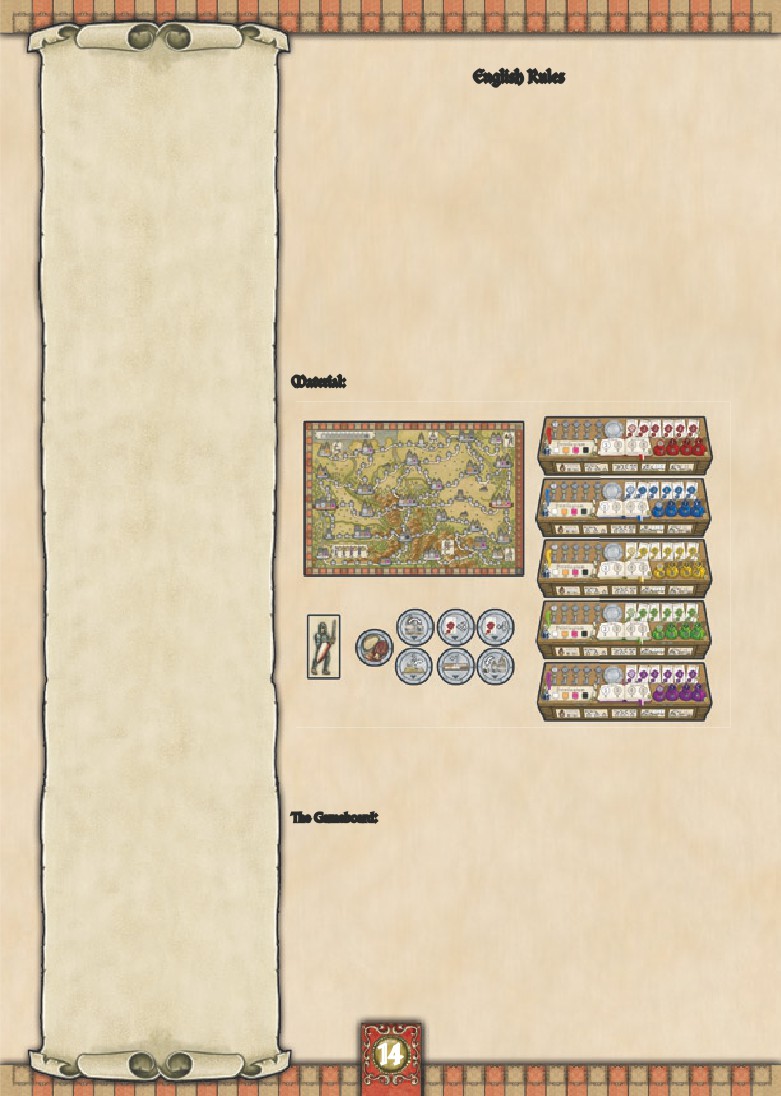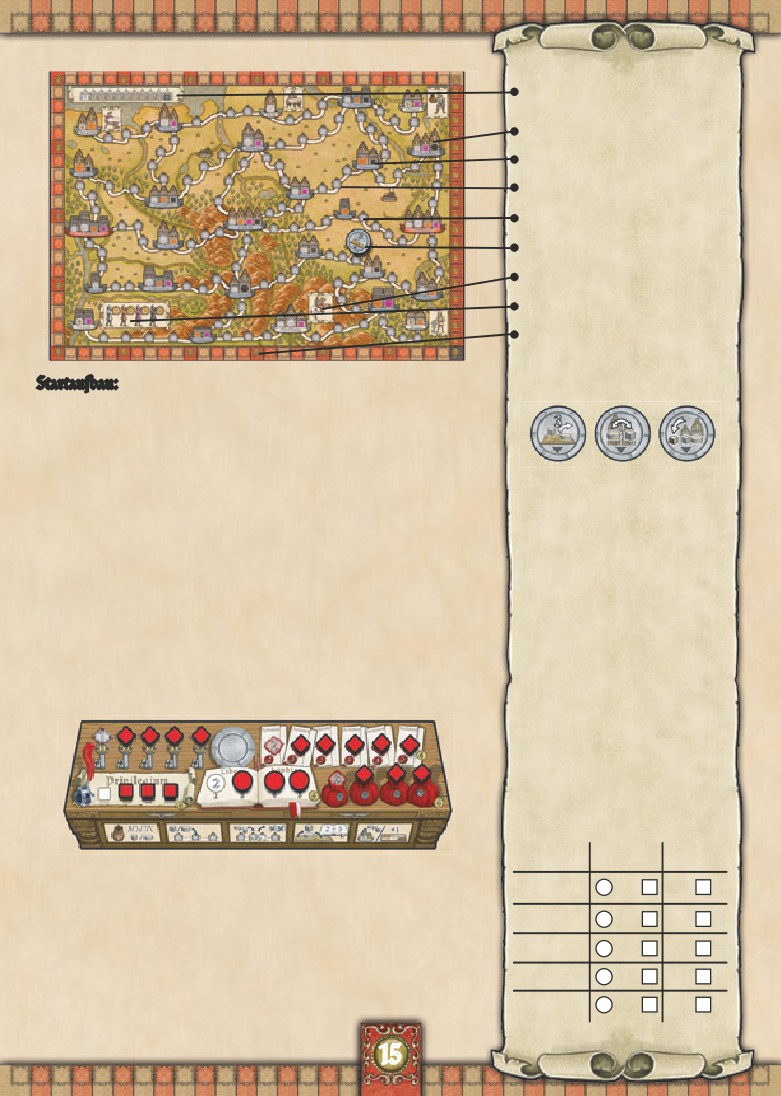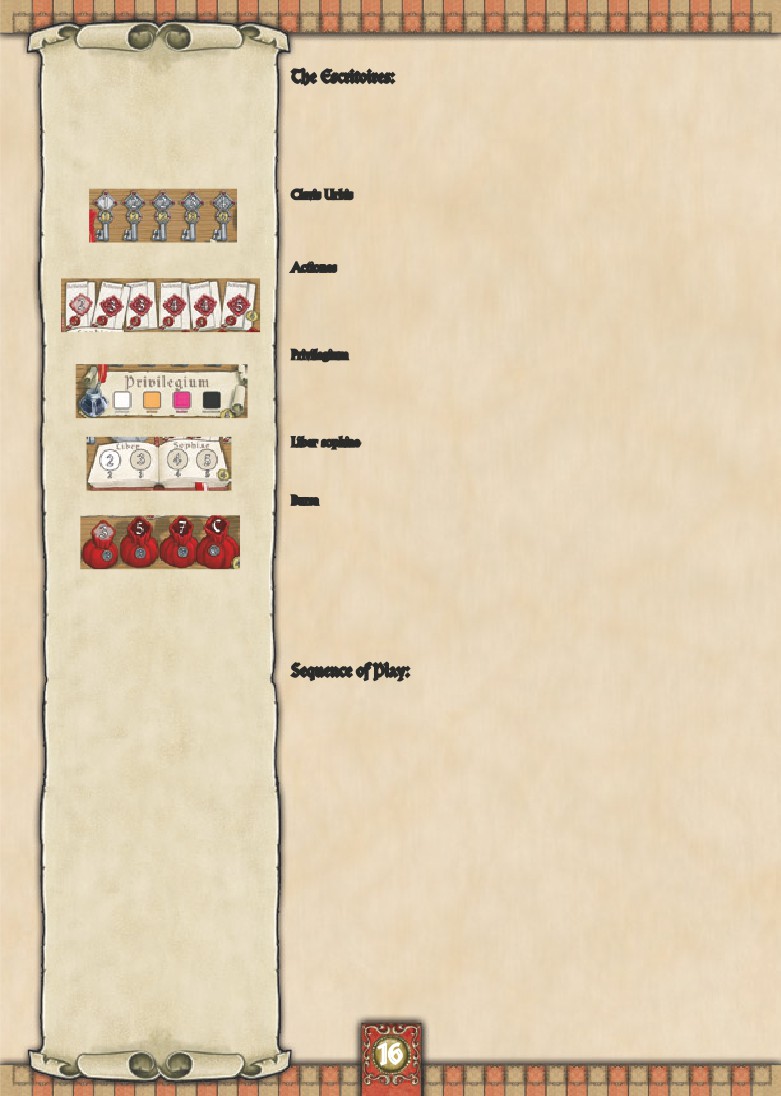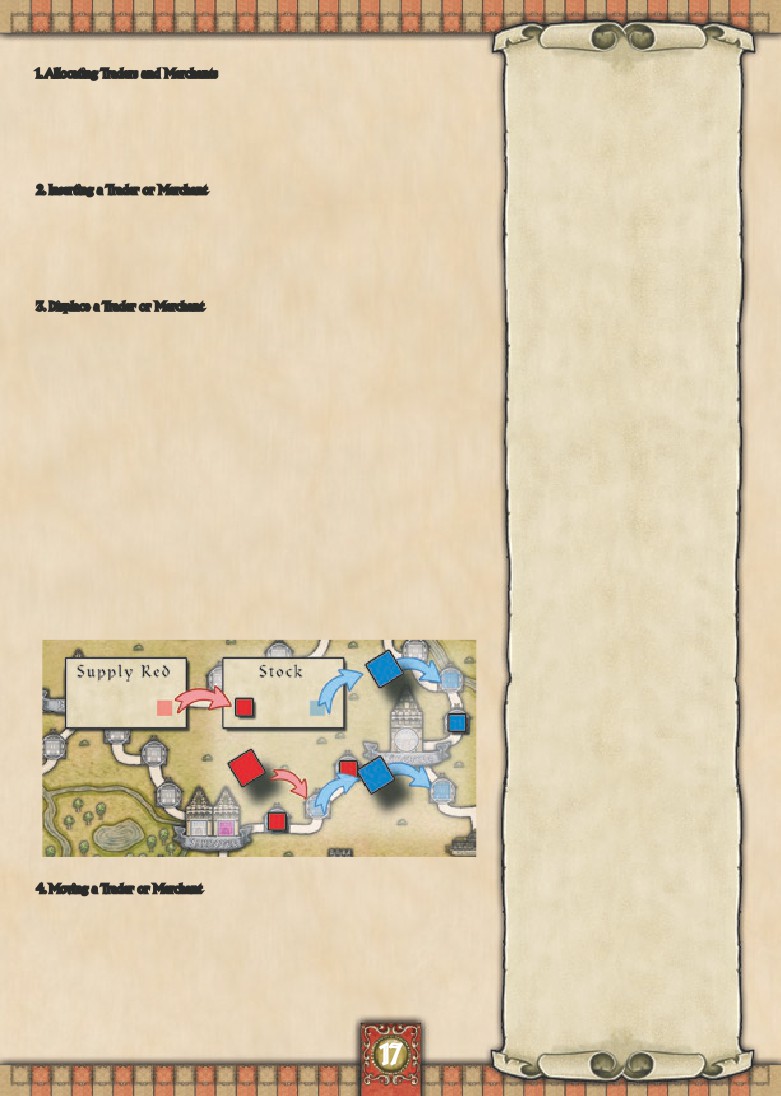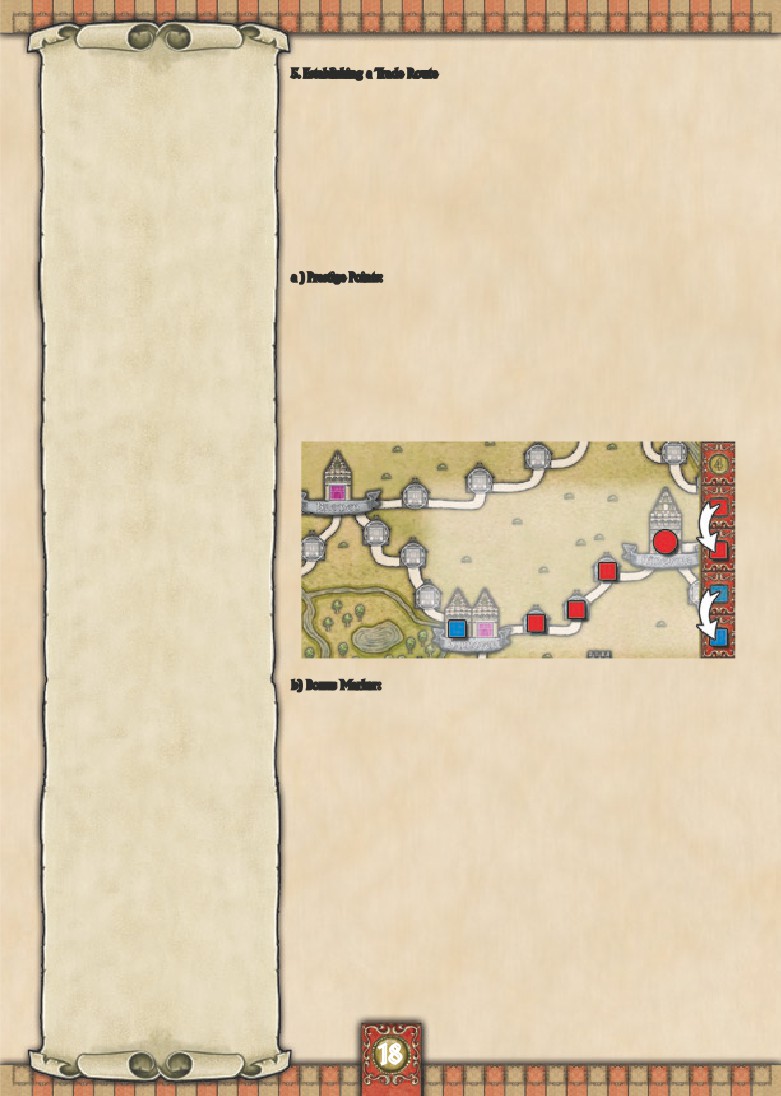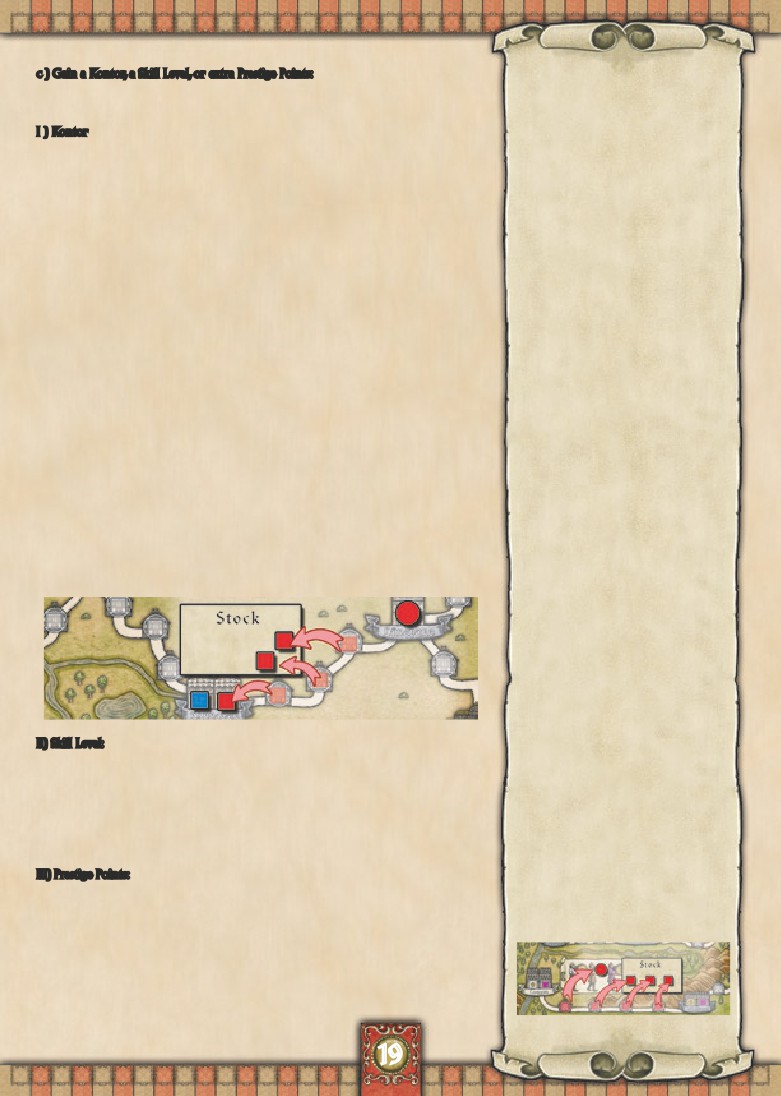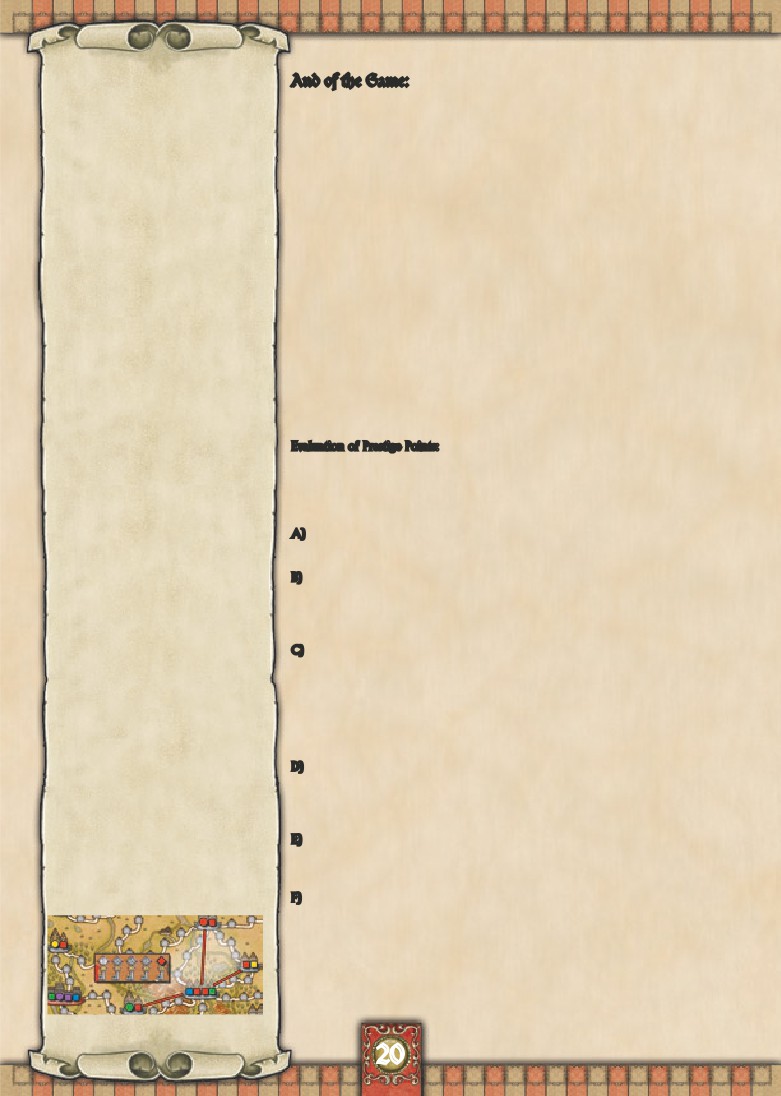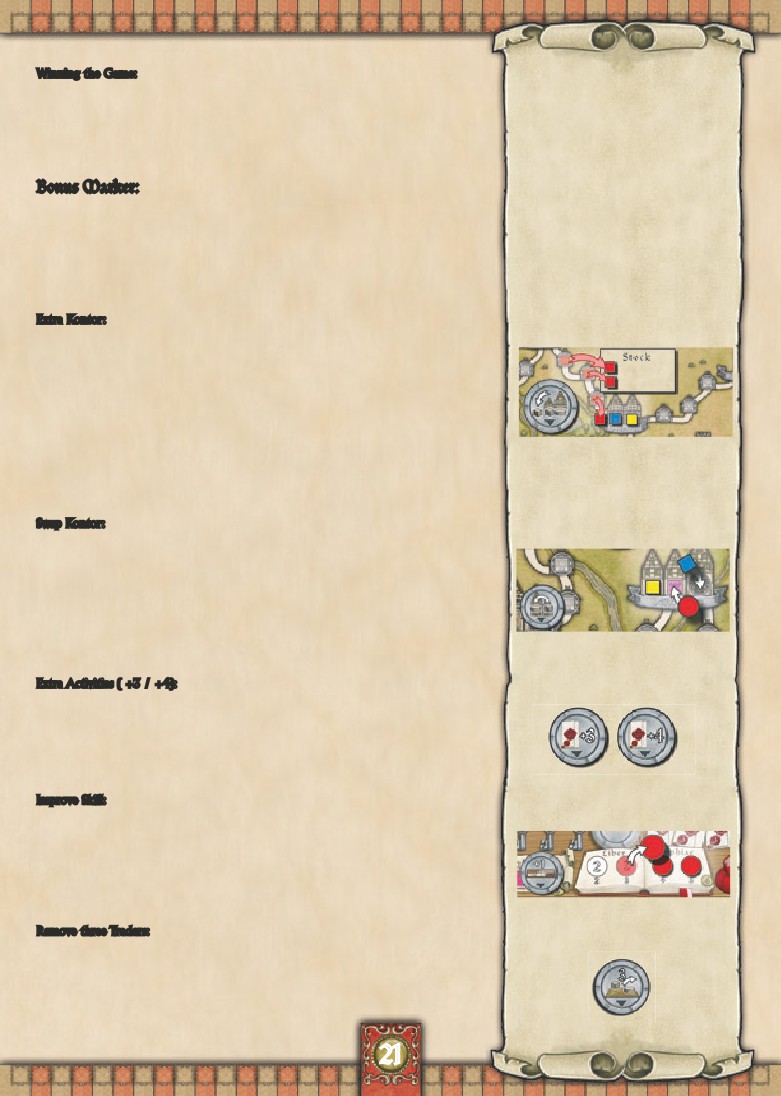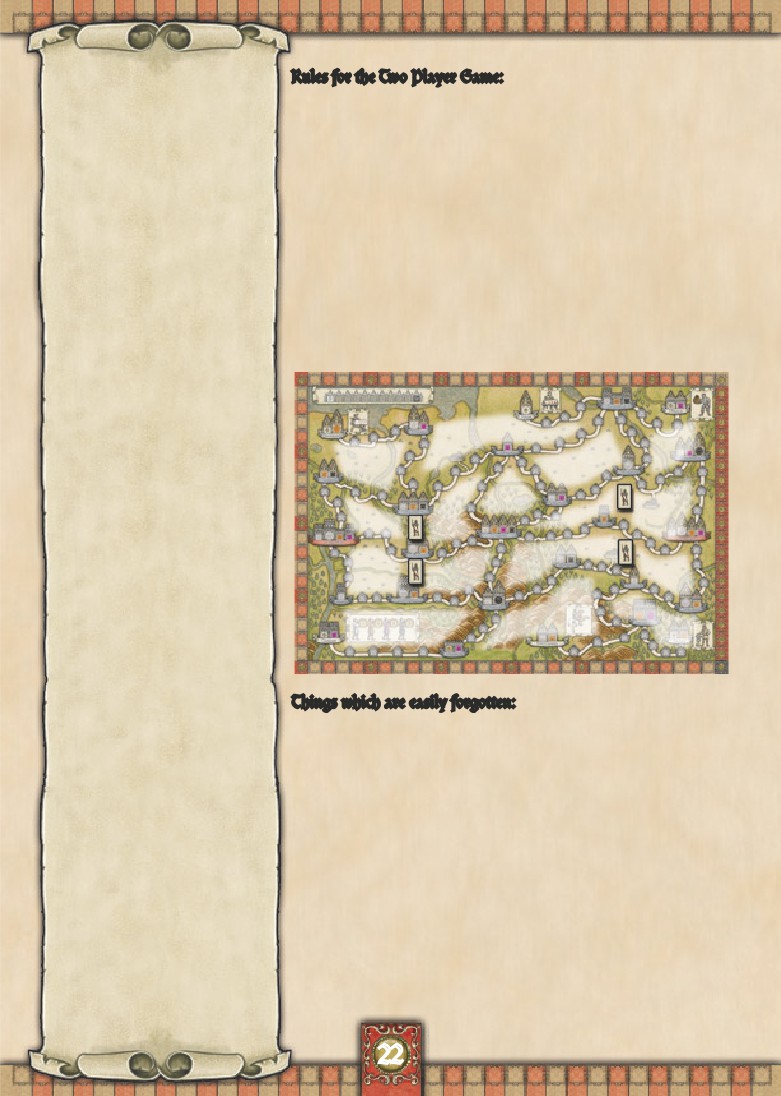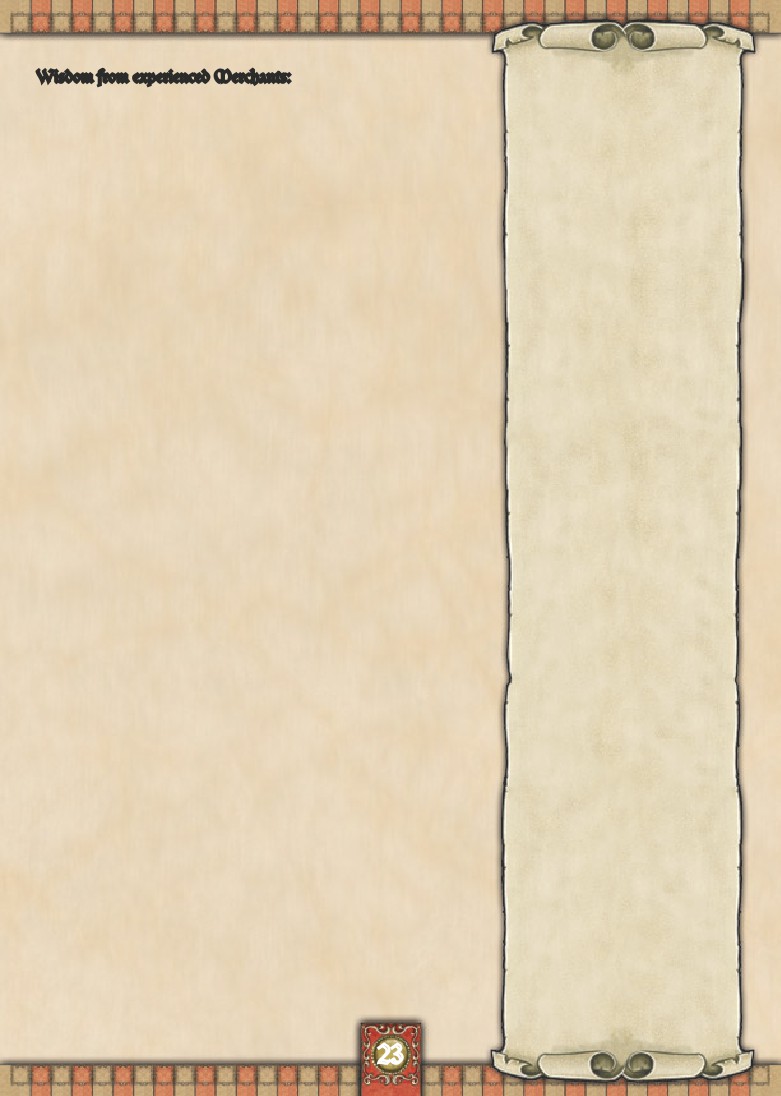English Rules
Background
Deutsche Hanse or, in Latin, Hansa Teutonica, are alternative names for the Hanseatic
League, an alliance between merchant guilds and (later) between cities originating
from lower Germany. Cities that joined the League were called Hansa cities. The League
emerged in the midth of the 12th century without being explicitly founded and there
was no formal apply for admission until the second half of the 14th century, so it is
almost impossible to tell exactly which cities belonged to the league within this period,
but altogether almost 200 cities were directly or indirectly involved.
Players attempt to increase their standing as merchants in the Hanseatic League by
gaining prestige points. This may be done in different ways: Establishing a network of
Kontors in new Hansa cities may be as promising as improving trading skills.
Players accomplish various activities during their moves. Traders may be inserted on
the gameboard, moved, or even displace traders from other players. If they eventually
occupy an entire trade route between two cities, a new Kontor may be established. But
players may also develop their trading skills instead in particular cities, improving their
abilities throughout the course of play. Winner of the game is the player who gains
most prestige points.
Material:
1 two-sided Gameboard (front side
1 two-sided Gameboard
5 Panels in shape of an escritoire
4-5 players, back side 2-3 players)
135 Traders (wooden cubes
- 27 in each player’s colour)
20 Merchants (wooden disks
- four in each player’s colour)
16 Bonus Marker:
5x Extra Kontor,
2x Swap Kontors
2x three additional Activities,
2x four additional Activities
4 soldiers
16 Bonus Marker
3x Improve Skill
2x remove three Traders
5 Panels in shape of an escritoire
1 “completed cities” counter (black cube)
1 Pawn for the two player game
and the following wooden pieces:
4 Cardboard Counter with soldiers to di-
135 Traders (wooden cubes, 27 in each player’s colour)
vide the gameboard into provinces in the
20 Merchants (wooden disks - four in each player’s colour)
two player game
1 “completed cities” counter (black wooden cube), 1 Pawn for the two player game
The Gameboard:
The gameboard shows a somehow arbitrary selection of Hansa cities with up to four Kon-
tors (branch offices, houses with square or round fields in white, orange, pink and black).
Trade routes with two to four steps (villages, house symbols) connect these cities. Five cities
(Groningen, Stade, Lübeck, Göttingen and Halle) show pictograms of trading skills which
may be enhanced if a trading route is established. In one city (Coellen) prestige points
may be gained. Tabernas (Latin for “tavern”) border the trade routes from Osnabrück to
Bremen, from Lüneburg to Perleberg and from Hildesheim to Goslar.
Additionally, the gameboard shows a prestige point track and a list of cities with com-
pleted Kontors (i.e., all houses are occupied by a trader or a merchant).
14
List of cities with
completed Kontors
Hansa City
Kontor
Trading Route
Free field
Taberna (with Bonus Marker)
City with trading skills
City with prestige points
prestige point track
Startaufbau:
Place on the three tabernae:
The following three bonus markers are shuffled and placed face up on the three Taber-
nas: 1 x Remove three Trades / 1 x Swap Kontor / 1x Extra Kontor
The small arrow shall point towards the trade route, making the allocation to that par-
ticular route more obvious. The remaining bonus markers are shuffled and placed face
down next to the gameboard. Each player chooses one colour and places the appropriate
escritoire in front of him. Additionally, he takes all 27 traders (wooden cubes) and four
merchants (wooden disks) of that colour. As a rule of thumb, merchants may be utilised
instead of traders during gameplay if not stated otherwise, but not vice versa (a trader
does not make a merchant). Sometimes the term “resource” will be used if either may be
chosen.
The fields of the trading skill tracks on the escritoires are covered with traders and mer-
chants - the square ones with wooden cubes, and the round ones (the Liber Sophiae track)
with wooden disks. Only the first (leftmost, shaded pale) field in each track is left free.
If a skill improves during gameplay, a cube or disk on the appropriate track is removed
(this basically means that players will have more traders and merchants available if they
develop their trading skills). The figures on the rightmost uncovered fields of the trading
skill tracks indicate the current abilities of that player. I.e., the initial values are one victory
point per Kontor, two activities per turn, basic privileges, two moves during one activity,
and three new resources.
Supply
Stock
Each player puts one wooden cube at the “zero” field of the prestige point track, and the
Startplayer
/ 5
6
“completed cities” marker is placed at the “zero” field of the “completed cities” track.
The start player is randomly determined. He will take five traders and the extant merchant
Player
2
/ 6
5
(the other three reside on the Liber Sophiae track on the escritoire) from his remaing
stock into his personal supply. Clockwise each following player puts one more trader in his
Player
3
/ 7
4
personal supply (i.e., the second player six, the third player seven, etc). During gameplay,
traders (and merchants) have to be assigned from stock to the personal supply before be-
Player
4
/ 8
3
ing used. Thus, stock and personal supply have to be kept separately all time (players may
agree to place the stock above and the personal supply below their escritoires).
Player
5
/ 9
2
15
The Escritoires:
The escritoires show pictograms of the five activities players may choose during their turn
(at the bottom, see “Sequence of Play” for details), a tin plate (where players may store
bonus markers) and five trading skill tracks showing current development level of the ap-
propriate attribute (the less symbols are covered the further developed an attribute is). In
detail, the five attributes are:
Clavis Urbis
(town key)
(1, 2, 2, 3, 4): The player’s overall standing in the Hanseatic League. At the end of the game
the player’s largest network of connected Kontors count the indicated amount of prestige
points per Kontor (see “Evaluation of Prestige Points”, item F for details).
Actiones (activities)
(2, 3, 3, 4, 4, 5): The player may perform as many activities in his turn as indicated by the
rightmost uncovered pictogram. In the beginning, this will be two activities per turn, but
this may grow up to five when the game proceeds. Note that newly acquired activities
may be used immediately.
Privilegium
Privilegium primum (Latin for basic privileges, required to establish Kontors in white
houses), minus (moderate privileges, orange), maius (higher privileges, pink), and maximus
(highest privileges, black) indicates which houses in a city the player may staff to establish
a Kontor. See “Establishing a Trade Route” for details.
Liber sophiae (book of lore)
(2, 3, 4, 5) indicates how many traders and merchants the player may move (not insert)
on the gameboard within one activity.
Bursa (money bag)
(3, 5, 7, C): Amount of traders (wooden cubes) and merchants (wooden spheres) the player
may take from stock into his personal supply as one activity. “C” stands for the Latin
word “cuncti”, which means “all” or “entirety” - thus, the player may move all traders and
merchants available in his stock into his personal supply. Note that traders and merchants
in stock need to be moved into the personal supply before they may be utilised by the
player!
Sequence of Play:
Players perform their turns in clockwise order. Each player performs as many activities
as their current trading skills allow (current figure on “Actiones”) before his turn ends.
Activities:
He may choose from:
1.Allocating Traders and Merchants
1.
Allocating Traders and Merchants
2.Inserting a Trader or Merchant
2.
Inserting a Trader or Merchant
3.Displacing a Trader or Merchant
3.
Displacing a Trader or Merchant
4.Moving Traders and Merchants
4.
Moving Traders and Merchants
5.Establishing a Trade Route
5.
Establishing a Trade Route
Any activity may be performed more
than once per turn
Activities may be performed in any order and may be repeated as often as the player
wants. But any activity has to be completed before the player starts a new one (you can-
Two activities per turn at the beginning
not “save” bits of an activity for later during your move). Players can perform two activi-
(Actiones)
ties per turn initially which may increase up to five by developing Actiones (remember
that players may use additional activities they gain immediately). Players do not need to
May increase up to five activities per turn
perform as many activities as possible.
16
1. Allocating Traders and Merchants
Move as many Traders and/or Merchants from your stock into your personal supply as
Put 3, 5, 7 or all resources from your
indicated by the “Bursa” track on your escritoire (three, five, seven, or all). Remember that
stock into your personal supply
players may only utilise resources in their personal supply. Take less if there aren’t suf-
ficient resources in your stock.
2. Inserting a Trader or Merchant
Put one trader or merchant from your personal stock on the gameboard. He may be
Put one resource on a trade route
placed on any free (not occupied by any other trader or merchant) field on any route
between two cities (other fields on that trading route may be occupied by own or oppos-
ing players resources). Do not place him inside a city (they are for Kontors only).
3. Displace a Trader or Merchant
Replace an opposing player’s trader or merchant from any field on any route between two
cities by someone from your personal supply and pay one additional resource (trader or
merchant) as a penalty from your personal supply to your stock. Pay two resources when
displacing a merchant (of course you may not displace anyone if you cannot pay).
The opposing player puts the displaced resource plus one additional resource (two if the
displaced resource is a merchant) from his stock on any empty field on an adjacent route.
“Adjacent” means that there is only one city between the field the resource has been dis-
placed from and the field it is moved to. Note that this counts “per resource” - i.e., one
resource may be placed on a route beyond the city terminating one side of the route and
the other one on a route beyond the city at the other side. Only if all adjacent fields are
occupied a field within a distance of two cities may be chosen, etc. If the player happens
to have insufficient resources in stock, he may take resources from his personal supply (if
this is still not enough he may take resources which have been placed on fields of trading
routes before.
The “displaced player” does not need to insert resources from his stock and/or personal
supply if he does not want to. But he may not move the “saved” resources from his stock
into his personal supply instead, not even the displaced resource (this has to be placed on
the gameboard again).
Note that it is possible to replace a merchant by a trader.
Replace one resource of an other player
by an own resource
Displacing trader costs one resource
Displacing a merchant costs two resources
Displaced resource plus one (two)
resources from stock go to an adjacent
route
4. Moving a Trader or Merchant
Move your own traders and/or merchants around the gameboard. Move up to as many
Rearrange two to five own resources on
as indicated by the “Liber Sophiae” track on your escritoire (two resources at the begin-
gameboard (Liber Sophiae)
ning, but this may advance up to five when you develop that skill). You may not insert
traders or merchants from your personal supply and you may not displace other play-
ers` resources (but you may swap the positions of one of your traders and one of your
merchants if you want to).
Note that you cannot move Kontors between cities or resources into cities.
17
5. Establishing a Trade Route
Establish a new trade route
If all fields of a trading route between two cities are occupied by only your traders and/or
Constraint: all steps of the trade route are
merchants, you may establish a new trade route (this is an activity, it does not happen
occupied with own resources
automatically). If you decide to do so,
a)prestige points are granted,
a)
prestige points are granted,
b)you obtain a bonus marker (if available),
b)
you obtain a bonus marker (if available), and
and
c)
a Kontor, a skill level, or extra prestige points.
c)a Kontor, a skill level, or extra prestige
points.
a ) Prestige Points: If a Kontor has been established in any of the adjacent cities already, the
player controlling the city gets a prestige point (“adjacent” means the cities terminating
Prestige points (PP) for adjacent cities
that particular trading route at either end). Advance the appropriate players markers on
the prestige point track. Advance one by two fields if the same player controls both cities.
No prestige point is paid for cities without Kontors. The player “controlling” a city is the
one having most Kontors in that city. In case of a tie, the one occupying the higher valued
house (the one further to the right) controls the city.
If a player reaches or exceeds 20 prestige points, the game ends immediately. See “The
Scoring” to learn how to proceed.
Note that prestige points are granted independent from any further activity in this phase
(you may just establish a new trade route, prestige points are distributed, and that’s it).
b) Bonus Marker: Remember that three bonus markers were allocated to the three trade
Take bonus marker if available
routes showing Tabernas during game setup. Skip this step if there is no bonus marker
allocated to the trade route you just established.
If a bonus marker is allocated to that trading route, take it. Put it face up in front of you
and use it in any of your turns. If you need a detailed explanation of the meaning of the
marker, have look at “Bonus Markers” at the end of the rules. Using a bonus marker does
not count as an activity. Bonus markers may only be used once and have to be turned
over after being used. But keep used bonus markers, they count prestige points at the end
of the game (see “Evaluation of Prestige Points, section C). Draw a new bonus marker and
put it face down on the tin plate on your escritoire without looking at it. If no new bonus
marker can be drawn (because there aren’t any left), the game ends immediately. See “The
Scoring” to learn how to proceed.
Before the next player starts his turn, look at the bonus marker(s) on your tin plate and
place them next to any route(s) of your choice (there need not to be a Taberna next to
it). Place a new bonus marker for each one you obtained during your move (there have
to be three bonus markers on the gameboard before the next player starts his turn). Do
not place a new bonus marker immediately after drawing it (this bars you from spending
any extra activities bonus marker just received to obtain a newly placed bonus marker).
Dedicate it to any trade route you want as long as the following three constraints are
fulfilled:
•No bonus marker is dedicated to that trade route yet.
•No trader or merchant is located on that trade route (i.e., all its fields are empty).
•At least one adjacent city has one free Kontor left.
18
c ) Gain a Kontor, a Skill Level, or extra Prestige Points: Usually you may build a new Kon-
tor in any of the two cities that are connected by the trade route you are establishing. But
depending on the city, you may promote a trade skill or gain prestige points instead.
I ) Kontor
Place one of your traders and/or merchants from the newly-created trade route in the
Put one resource from the trade route into
lowest available house in an adjacent city of your choice and put all other resources on
an adjacent city
that trade route back into your stock (not your personal supply). “Adjacent” means one
of the two cities on any end of the trade route. “Lowest” means the leftmost house in that
city which is not yet occupied by a trader or merchant.
Do not leap out houses. And you have to meet these requirements:
•Houses with square fields demand traders and houses with round fields demand mer-
chants. I.e., if you need a merchant but have only traders on the trade route, you may not
found that new Kontor.
•You need to possess an adequate Privilegium. I.e., to occupy an orange house, you need
at least “Privilegium minus”.
•You need the bonus marker “extra Kontor” if no empty house is available (see “Bonus
Markers” for details).
If the house your trader moves to shows a golden coin, you immediately gain one victory
point (increase your counter on the prestige point track accordingly). If your trader or
merchant moved into the last empty house in that city (all houses are occupied now), in-
crease the “completed city” marker. If the marker reaches ten, the game ends immediately.
See “The Scoring” to learn how to proceed.
Note that even if you do not meet the requirements or if all houses in both cities termi-
nating a trading route are busy you still may establish a new trading route - someone will
obtain prestige points (see section a), and you may gain a bonus marker (see section b).
Establishing a Kontor network between Arnheim and Stendal is rewarded by prestige
points. “Kontor network” means that there has to be an uninterrupted chain of con-
nected cities all containing at least one of your traders or merchants. The first player who
achieves this goal gets seven prestige points, the second player four, and the third one two
prestige points (advance your prestige point counter accordingly). Note that you do not
need to control a city (see section a), you only need to have a Kontor there.
If a payer reaches or exceeds 20 prestige points, the game ends immediately. See “Evalua-
tion of Prestige Points” to learn how to proceed.
II) Skill Level: If one of the adjacent cities is Groningen, Stade, Lübeck, Göttingen or Halle,
Improve one trade skill instead
you may promote the appropriate skill instead of establishing a Kontor. Put all traders and
merchants from the trading route back into your stock and the leftmost trader (Clavis
Urbis, Actiones, Liber sophiae, Bursa) or merchant (Liber Sophiae) from your escritoire to
your personal supply. The skill you promote depends on the city (Bursa in Lübeck, etc).
The value on the vacated field indicates the new skill level (it may actually be the same
value than before). The new value may be used immediately - in particular, if Actiones
increase you immediately gain an extra activity for the current turn.
III) Prestige Points: Establishing a trade route between Coellen and Warburg, you may staff
Allocate prestige points instead
any empty field on the prestige point tableau next to Coellen with a merchant from the
trade route instead of establishing a new Kontor (the other resources from the trade route
go back into your stock). But you have to hold the appropriate Privilegium to occupy
a field: Like, you need at least Privilegium maius to occupy the pink field and gain nine
prestige points at the end of the game.
Not that you will get the indicated prestige points at the end of the game, not now. Thus,
they have no influence on the end of game conditions mentioned in section “End of the
Game”. Note also that different to building Kontors, you may skip fields in this case, they
do not have to be occupied in order.
19
And of the Game:
The game may end in three different ways:
End of game:
•A player accomplishes 20 or more prestige points. The activity that led to this condi-
20 or more prestige points
tion is finalised, then the game ends. Note that the activity need not to be executed by
the player meeting the condition, this may well be two different players. Note also that
the player’s activity is finalised, not the player’s turn.
•No replacement bonus marker is available (remember that you keep bonus markers
Bonus marker cannot be placed
even after use, as you get prestige points for them, see below). Note that this happens
when you draw a new bonus marker at the end of an “Establishing a Trade Route” activ-
ity, not at the end of your turn when you place new bonus markers on the gameboard.
Note also that the player’s activity is finalised, not the player’s turn.
•The “completed city” marker is advanced to the “ten” field. The activity that led to this
Ten cities are occupied
condition is finalised, then the game ends.
•Remember that during gameplay prestige points are only granted when a trade route
Prestige point payout during game only
is established (gained by the players controlling the neighbouring cities), when a Kontor
for controlled cities when a new trade
is established on a house bearing a golden coin and when Arnheim and Stendal are con-
route is established, houses with golden
nected by a network. Any additional prestige points are paid out later and do not count
coins and network from East to West
for end-of-game condition (especially the prestige points gained in Coellen).
Evaluation of Prestige Points:
Prestige points:
Prestige points may be evaluated in two different ways, either by summing them up us-
ing the prestige point track, or by using a spreadsheet which may be downloaded from
A)
Gained during gameplay
Of course you keep the prestige points you acquired during gameplay.
(0-27 PP)
B)
Add four prestige points for each skill you developed to the maximum (i.e., there is no
Fully developed Skill
trader or merchant left on that particular trading skill track on your escritoire) except
(each 4 PP)
“Clavis urbis”.
C)
Bonus Markers
Add prestige points for bonus markers according to the following table:
1 Bm: 1PP
2 od. 3 Bm: 3 PP
4 od. 5 BM: 6PP
1 BM - 1 Pt; 2 od. 3 BM - 3 Pt; 4 od. 5 BM - 6 Pt;
6 od. 7 Bm: 10 PP
8 od. 9 Bm: 15 PP
6 od. 7 BM. - 10 Pt; 8 od. 9 BM. - 15 Pt; 10 or more BM. - 21 Pt.
10 + Bm: 21 PP
D)
Allocation table at Coellen
Add prestige points as indicated on the prestige point table next to the city Coellen.
(7 / 8 / 9 / 11 PP)
Your merchant(s) went there during the course of the game, but you haven’t received any
prestige points for that by now.
E)
Each controlled city
Each city is scored: The player controlling it (see 5(a) to learn what “controlling” means)
(2PP)
gets two prestige points.
F)
Network
Count the amount of Kontors in the largest network you have on the gameboard. These
Kontors belong to cities which are directly connected with each other (i.e., there is a trade
route between). Multiply that with the “Clavis urbis” skill on your escritoire and add the
result to your prestige points.
20
Winning the Game:
The player with most prestige points wins the game. In case of a tie, more than one player
win the game.
Bonus Marker:
There always will be three bonus markers on the gameboard at the beginning of each
Replace bonus markers at the end of
players turn. If bonus markers are allocated, they will be replaced at the end of the players
your turn
move. See 5(b) for details. The following bonus markers are available:
Choose route without bonus markers and
resources and with one free Kontor left
in one of the adjacent cities
Using a bonus marker is not an activity
Extra Kontor:
You may ignore the restrictions for establishing a new Kontor in a city. Just place one of
Use when establishing a new trade route
your traders (or merchants) left of the houses of a city when you establish a new trade
route (rather than occupying the leftmost empty house). The only prerequisite is that at
least one house in the city is occupied already (no matter by which player).
When the game proceeds, this is a regular Kontor. It only counts less than the leftmost
“regular” Kontor when it comes to controlling a Kontor (see 5(a) for details). Additional
“Extra Kontor” may be build left of the first “Extra Kontor”. Such an extra Kontor may
not be choosen when using a “Swap Kontor” bonus marker (see below).
Swap Kontor:
Swap two counters in adjacent houses inside one city. Do not care for the shape of a coun-
Swap two resources in adjacent houses
ter - i.e., you may move a trader from a “square field house” to a “round field house”.
Also, do not care about your Privilegium - you may move one of your counters on a
“pink house” although you only have Privilegium minus.
Extra Activities ( +3 / +4):
Depending on the kind of bonus marker you use, you have three or four extra Actiones
Extra Activities ( +3 / +4):
in your turn.
Improve Skill:
Improve any trading skill by removing the leftmost trader (in case of Liber Sophiae: mer-
Increase one skill
chant) on one of the five trading skill tracks on your escritoire. Put it to your personal
supply.
Remove three Traders:
Actually, you may remove merchants as well. Just take any three resources from any trad-
Remove three resources from the game-
ing routes of your choice and put them in the appropriate player’s personal supply (or
board
players` personal supplies). Do not remove resources from inside cities, only from trade
routes.
21
Rules for the Two Player Game:
Two player game:
The gameboard is divided into provinces. Borders are the trade routes and four soldiers
which are placed between Osnabrück and Münster, between Münster and Dortmund,
Same rules, but
between Lüneburg and Bruinswiek and between Bruinswiek and Goslar.
Gameboard divided in provinces, trade
An additional pawn is introduced to the game which moves over the gameboard from
routes and four soldiers are borders
province to province. Players may move the pawn over two borders (trade routes or sol-
diers) before or after their moves (i.e., before the first activity or after the last activity)
Move extra pawn over one or two borders
with no expenses. Players may also move the pawn to any province any time during their
for free before or after your turn
move, but then for the price of one activity.
Moving the extra pawn any distance
Activities “Inserting a Trader or Merchant”, “Displace a Trader or Merchant” and “Es-
during your turn costs one activity
tablishing a Trade Route” may only be performed when the new pawn is present (i.e.,
standing next to the trade route, which is a border to that province now). There are no
Inserting a resource, displacing a resource
restrictions for activity “Moving Traders and/or Merchants”.
and establishing a trade route require the
pawn being present
Before starting the game, one player will put the pawn in any province he wants. The other
player will become start player.
Things which are easily forgotten:
•Establishing a new trade route, all traders and merchants from that route are put back
into stock (except the one used for a new Kontor, which goes into a city).
•Players controlling the city on each side of a newly established trade route gain a pres-
tige point each immediately.
•New bonus markers are placed on the gameboard at the end of a players turn.
•If a new Kontor occupies the last empty house in a city, advance the “occupied cities”
counter.
•Put the resource in your personal supply if you improve a trade skill.
•If you displace another player`s resource, don’t forget to pay one (two) resources from
your personal supply to your stock. And the other player gets one (two) resources from
his stock and puts them on the gameboard.
•Establishing a new trade route costs one activity (it does not happen automatically when
you occupy all fields of a trade route).
22
Wisdom from experienced Merchants:
The game offers plenty of possibilities to gather prestige points. Only after having
played the game a few times you will have an impression on how many options there
are. The ones who do not want to loose the fascination on finding out by themselves
should not continue reading but rather start playing. The others may find the following
helpful.
Nothing to say against Actiones being very powerful, but the other skills are very power-
ful as well when used deliberately. It depends on the course of a game how powerful each
skill actually becomes.
If you have plenty of skill in Liber Sophiae you may try to be displaced frequently. You
will have many resources on the gameboard without the continuous need to refill your
personal supply and having to insert new resources again and again.
You will gain many prestige points at the end of the game succeeding to establish a large
network of connected Kontors (although you may suffer from resource shortage when
you don’t develop your skills too much).
Cleverly utilise your merchants on trade routes to have them by hand when you want to
establish Kontors, or on the prestige point tableau at Coellen.
Bonus markers offer two advantages: They allow special activities, and they count prestige
points at the end of the game.
Have an eye on the other players activities. If you leave too many opportunities for your
opponents you need not to wonder how well their strategy went at the end and how
many prestige points they gain. Every strategy is only as powerful as the other players
allowed it to become.
The first extension of a skill is always affordable, and you should look forward to have
three actiones soon.
The author likes to thank the many test players, especially Matthias Beer, Uli Bruhn,
Martin Munzel, the Göttingen Spielekreis, Richard van Vugt and GamePack.nl and the
game circles in Cologne.
The publisher’s team likes to thank all test players, especially non-stop testers Thomas
Reh, Markus Rosner and Sabine Detsch and all the people who read the rules, especially
the folks at Cliquenabendl and Daniela Reh.
Extra thanks to Andreas Odenthal and Katrin Berens-Ottmaier for their
support in many ways.
Many thanks also to the test players at Herner Spielewahnsinn and
„Münster spielt Brett“.
And last but not least a warm thank you to Hippodice Spieleverein where this game
reached the finals in this years game author competition
(under the name „Wettstreit der Händler“).
© 2009 Argentum Verlag
Brabanter Straße 55 50672 Köln
Author: Andreas Steding • Illustration: Dennis Lohausen • Redaktion: Klaus Ottmaier
English Translation: Roman Mathar
23
